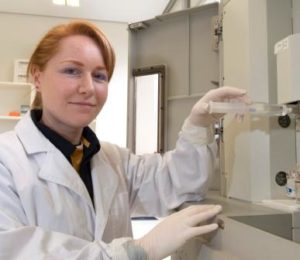
A high resolution paternity test to help combat the illegal carpet python trade is being developed by Flinders University wildlife forensic DNA specialist Sherryn Ciavaglia.
As part of her PhD under the supervision of Professor Adrian Linacre, Ms Ciavaglia is developing a DNA paternity test similar to that used in human forensic science to determine whether individual carpet pythons are biologically related to their parents or if they have been illegally taken from the wild.
Results of the profiling technique will ultimately be used to create a database of genetic information across the natural range of carpet pythons to identify potential poaching hotspots.
While carpet pythons are not in immediate threat of extinction, various laws to protect their future have been implemented worldwide; prohibiting the import or export of carpet pythons across borders without a permit.
Ms Ciavaglia, a forensic biologist at Forensic Science SA, said the pet trade and demand for “unique” carpet pythons is a major problem for environmental enforcement officers and conservationists.
“The pet industry is extensive but there’s also a big commercial market where breeders will cross species to create pythons with unique physical features such as bright colours or interesting patterns,” Ms Ciavaglia said.
“While inexpensive Australian pythons are frequently kept as pets, a single uniquely patterned python can sell for many thousands of dollars,” she said.
“That’s why laws monitoring breeding and managing trade are vital to protect their future.”
As part of her research – a collaboration between Flinders, Forensic Science SA, the State’s Environment Department and the South Australian Museum – Ms Ciavaglia is also developing a DNA test to identify carpet python species when they cannot be identified visually.
She said the main aim of the project is to aid in the prosecution of poachers by providing validated techniques to be used as corroborating evidence in court, as opposed to developing tests for research applications.
“In the legal system the tests have to be much more reliable and robust with fewer errors than in a research setting.
“The illegal trade in native animals and products has been an ongoing problem but there’s a relatively low success rate in getting convictions in court, partly because of the limited evidentiary tools available.
“Therefore it’s really important to develop reliable techniques that will lead to more successful prosecutions.”
Ms Ciavaglia is one of 14 Flinders researchers who will be presenting at the 22nd International Symposium on the Forensic Sciences, organised by the Australian and New Zealand Forensic Science Society (ANZFSS), at the Adelaide Convention Centre next week.
The five-day symposium, which starts on Sunday (August 31), will unite 750 delegates from 24 countries for an informative scientific program addressing issues across 18 disciplines; including crime scene investigation; fingerprint examination; electronic evidence; firearms, fires and explosives; illicit drugs; pathology; wildlife forensics; archaeology; and education and training.
Flinders presenters include Professor Paul Kirkbride, who will discuss breakthroughs in gunshot residue evidence; Kelsey Seyfang, who will discuss the use of toughened glass in portable devices for forensic purposes; Taryn Guinan; who will present research on aspects of fingerprint examination; and Jennifer Templeton, Renée Ottens, Alicia Haines and Anastasia Khodakova will present on aspects of forensic DNA..
As part of the symposium, Flinders Associate Professor Stewart Walker, the chair of education and training for the ANZFSS, will also be running a workshop on mass spectrometry of trace evidence as well as a forensic education forum.
Flinders Professor Adrian Linacre, the scientific program chair of the conference and president of the SA branch of the ANZFSS, said the event will showcase forensic research breakthroughs from Flinders.
“It is evident that Flinders University now leads in areas of forensic science research,” Professor Linacre said.
“This conference allows us to showcase to an international audience our breadth of research and how our projects can, and will, make a real difference to criminal investigations.”
For more details about the symposium visit the ANZFSS website.

